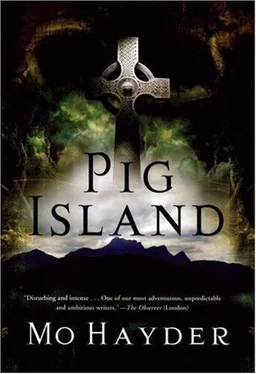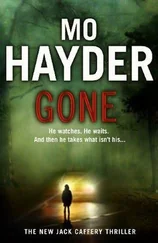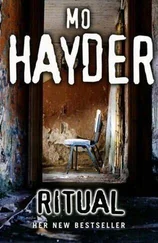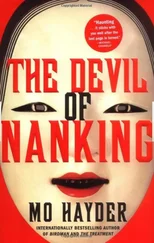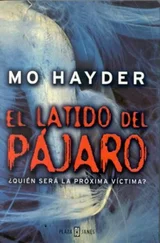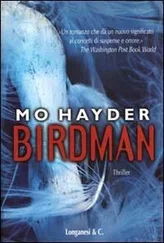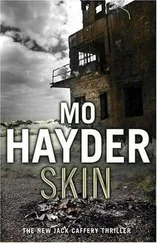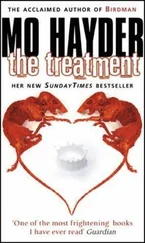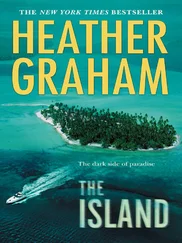Angeline had been trying to get us to leave the room, to get some proper rest — there were couches in the relatives' room we could stretch out on, and she'd call us if anything happened. She kept limping in and out of the room, ferrying coffee and Snickers bars, asking when they were going to wake Lex up. At eleven a.m. on day two she brought in four doughnuts in a pink-and-white-striped box. There was a blue picture of a chef's hat on it. She placed a napkin on the chair next to Lex's ma and carefully put two doughnuts on it.
Lex's mother looked down at them and gave a small laugh. 'And they say the nation's youth don't know how to eat properly.'
Angeline paused, and for a moment I thought she was going to take the doughnuts back. But she didn't. Instead she straightened and moved calmly to my chair, putting the box down and setting the coffee next to it. 'My mother's dead,' she said, addressing no one, but making us both raise our eyes to her. 'My mother's dead, but she was beautiful. She was beautiful and she was kind. And she loved me.'
I looked at her. Somehow in the last two weeks her hair had grown enough to cover the bare patches of scalp. It was brushed and there was even a bit of light reflected in it. She looked like she'd put some mascara on and there was something defiant about her as she stared at Lex's ma.
'Yes,' she said, almost trembling with the effort of keeping her voice in control. 'And you know what? I think she was right. I think she was right to love me.'
She rested a napkin on top of the doughnut box, and, like nothing had been said, like we weren't both staring at her, she sat on the chair in the corner, pulled the lid off her coffee and drank.
Autumn was coming, and out of the window, level with the third floor, the monuments and mausoleums of the Necropolis towered dark against the cloudbanks. On the roadway below the ward patients stood in dressing-gowns and slippers, smoking quick and intent, trying not to look up at those grave markers, at the austere statue of John Knox. Angeline sat in silence, watching me from the opposite side of the hospital room.
It was the third day and it had been a morning of skin. The Burns Unit nurse brought in a fringed tape to measure for pressure garments, leggings that would stop the scarring and make sure Lexie could move her joints when she healed. She'd have to wear them for a year and a half, said the nurse. A technician from the Myskin labs came to take biopsies. Where he worked, they could take small pieces of skin and grow them into sheets ready to graft back. At lunchtime the plastic surgeon started pushing the neurologist a bit: he wanted to debride Lexie's legs, snip away the dead flesh. The neurologist hummed and hah-ed but in the end they settled on that afternoon. By the evening Lexie would be out of theatre and in a high-dependency ward on the Burns Unit. Awake. She'd know all about her future, about the clinical-psychology services, and about how her skin was being grown in a lab a hundred miles away.
In the chair next to Angeline, the Ice Queen was dozing, her chin on her chest, a society mag crumpled on her lap. When Danso arrived he didn't come into the room, probably didn't want to face her. Instead he stood at the door with Struthers, looking like Columbo or something in his crumpled raincoat, and tapped on the windowpane, beckoning to me and Angeline.
'We're taking you for coffee,' he said, when we came out. He was holding the day's local newspapers and you could see it in their faces: something was up. Especially Struthers. He looked like he'd been given an extra pint or two of blood overnight. 'Something's changed and we're taking you for coffee.'
Danso set off in the direction of the hospital cafeteria and, without hesitating, I followed, keeping pace with him, going through the plastic crash doors, out through the car park, the drizzle plastering our hair to our heads. Struthers hung back with Angeline, offering his arm to her as she limped along.
'I'm going to tell you this now,' Danso said, as we went ahead of them through another set of plastic doors, back into the main building, our feet squeaking on the polished floor. He didn't turn to look at me: he kept his eyes on the door of the cafeteria at the end of the corridor. 'I'm going to tell you while he can't hear.'
'Struthers?'
He nodded. 'It's not why we're here but it's important to you and I wanted you to hear with a bit of privacy.'
'You wanted me to hear what?'
'We got the results back. This morning. From the forensic examiner.'
I was in mid-stride. I let the step hesitate a bit, my foot slowing in mid-air, then continue down in slow motion. It hit the floor and I carried on at the same speed. Like he hadn't said anything at all.
'They came back,' I said, my voice level. 'And?'
'And he left nothing. Nothing under her fingernails. No hair, no skin.'
'She'd have fought.'
'Yes. Three of her nails were torn off. The others…'
'The others?'
'He'd cleaned. Scrubbed. They watch so much crime TV they all know how to cover their forensics these days. She'd have been unconscious.'
I kept walking, letting this settle on me.
'What does that mean, Peter, he left nothing?'
Danso stopped. We'd reached the cafe and he stood, his hand resting on the door, looking at me seriously. A ghost scene of him as my father played briefly in my head. I'd had that before, with Danso.
'He didn't get to her, son,' he said, resting a hand on my shoulder. 'Why did he leave her naked? Who knows? But he didn't touch her, so you can let that go.'
I stood there, getting an embarrassing urge to put my arms round him because a huge, paralysed section of my mind had clicked a bit and started to function again, like an iceberg coming free of the icecap. Then Struthers and Angeline appeared at the end of the corridor, coming towards us, and the moment was gone. Next I knew we were in the cafe, pulling off wet coats and finding a table near the radiators.
Danso drank tea from a stainless-steel pot and the rest of us had coffee in plastic filters that dripped all over the table. We ate damp ginger biscuits from heavy white plates still hot and cabbagy smelling, like they'd come straight from a dishwasher. The cafeteria was a Turkish bath, the tea urns and the hotplates steaming the place up, making the windows drip with condensation.
Danso and Struthers kept us waiting. They fed us snippets of information that hadn't got anything to do with the big news. They said they thought Dove had found us through the rental car. Somehow, Christ knew how, he must've picked me up on one of my drives, maybe from Oban police station, and had been watching the rape suite for days. They told us there had been seventy-eight public sightings of the saloon car, because it turns out a Celtic kit hanging over the back shelf isn't such a rarity in that part of Scotland. They showed us a tiny column in the Glasgow Herald saying the police were refusing to confirm or deny an attack in Dumbarton, which had left one woman critically ill in hospital.
'Which reminds me…' Danso wiped his mouth and looked at me. 'Something else I wanted to ask you.' He swallowed his mouthful of biscuit. 'The car. You sure you didn't see that car parked?' He pulled a biro from the inside of his jacket, and uncapped it with his teeth. He unfolded a napkin and made some rudimentary lines on it. 'See, we think it could have been parked here.' He made an X on the road that led to the east of the estate along the playing-fields. 'What do you think?'
'Could have been. When I saw it,' I pointed to the parallel road, 'it was here — on this road.'
'So, let's get this straight. You'd driven in from here,' he marked the west road, 'from where your babysitter was, so you stopped here, facing this way, and you saw him here, parallel to Humbert Place.'
Читать дальше
